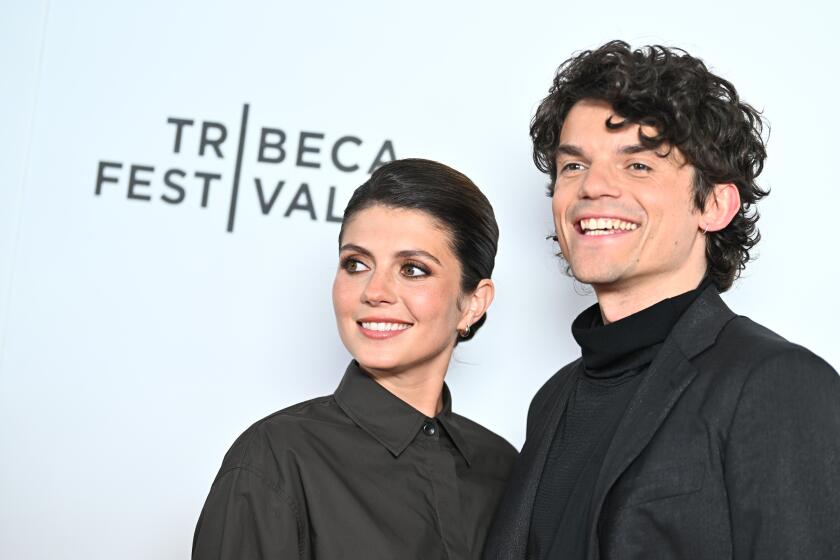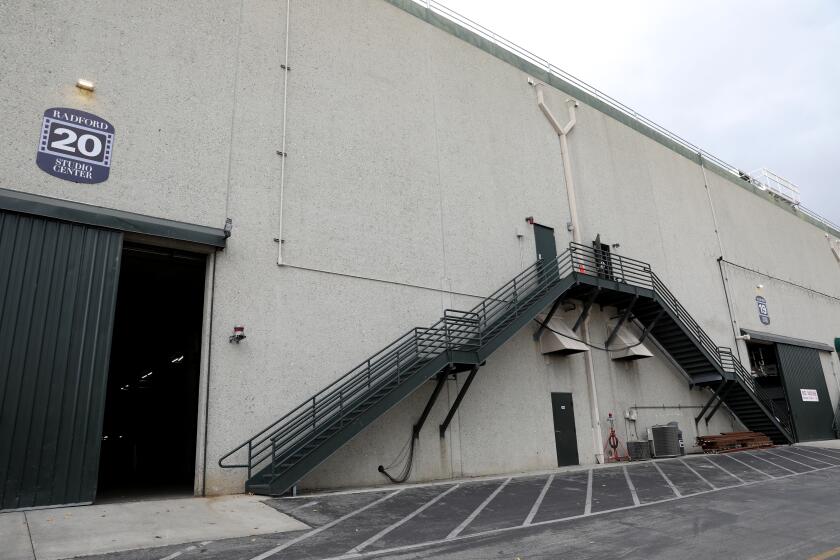Accomplished ‘Dogs’
The American Cinematheque’s Alternative Screen showcase joins forces with the Independent Feature Project/West’s Festival Buzz series in presenting at the Lloyd E. Rigler Theater at the Egyptian (6712 Hollywood Blvd., Hollywood) tonight at 7:30 “Dead Dogs,” a prime example of what can be accomplished within genre and when imagination and discipline are made to count for more than budget. A neo-noir of the first rank, it makes excellent use of its key setting, a large, attractive motel complex in Grand Forks, N.D.
Joe Reynolds stars as Tom, a likable young security guard working the night shift at the motel. He leads a minimalist existence, having drifted into an affair with one of the maids (Suzanne Carney), a bored married woman. He has struck up a friendship with the night desk clerk (John Durbin), a man of clear superior intelligence who may be an aspiring writer or student on the side. It’s this relationship that gives Tom whatever meaning his life has.
Out of the blue he receives word that his older brother Derek (Jay Underwood) will be passing through town. They haven’t seen each other since Derek cut out three years earlier, taking Tom’s girlfriend Carmen (Margot Demeter) with him. Derek has always been bad news, and now he and Carmen, who are petty thieves constantly on the road, are returning to rob the motel over the upcoming lucrative Fourth of July weekend. Cutting back and forth between the couple and Tom, director Clay Eide and writer Todd Bulman fill us with dread, and we hope against hope that somehow Tom will not have his life destroyed as a result of a reunion that is surely the last thing he needs. How the filmmakers and their first-rate cast (in which Durbin is a standout) take things from there is not nearly as predictable as you might think.
Playing with “Dead Dogs” is experimental filmmaker Bill Morrison’s luminous 12-minute “The Film of Her,” a celebration of the power of ancient film images as Morrison draws upon an actual incident, the determination of a Library of Congress employee to save the library’s paper reels, often the only record extant of early American cinema, from the incinerator. A collage of those early reels focuses on the indelibility of erotic images upon the memory. (323) 466-FILM.
The second annual “Dances With Films Festival” of independent productions will present 12 features and 12 shorts at the Monica 4-Plex (1332 2nd St., Santa Monica) Friday through July 29. Among the films are two examples of regional filmmaking at its best, Lyn Clinton’s “The Height of the Sky” (Saturday at 7:15 p.m. and Monday at 12:30 p.m.) and Katherine Griffin’s “The Innocents” (Sunday at 7:15 p.m. and Tuesday at 2:45 p.m.); both are highly accomplished first films.
It’s worth the effort to connect to the rightly leisurely pace of “Height,” which is set in rural Arkansas in 1935 and deals with the disintegration of two tragically interconnected families. On the one hand are the landowning Caldwells, decayed aristocrats; on the other, their sharecroppers, the Jones family, which is thrown into crisis when a son is stricken with tuberculosis. In the forefront are two young people, Evan Caldwell (Evan Palazzo), a decent young man, and Leora Jones (Jennifer Weedon), the mainstay of her motherless family, a bright, strong-willed young woman determined to make a better life for herself. Clinton, drawing from an old story in her own family, avoids the cliche of the young people falling in love and bridging class and reveals herself to be a terrific storyteller who already demonstrates a knack for drawing fine performances from a large and varied cast.
As actress and as a writer-director-editor Katherine Griffin displays much promise on either side of the camera in “The Innocents,” also a small-town period piece that deals with the past’s grip on the present. Set in a Midwestern town in the summer of 1961, it focuses on a friendship that unexpectedly blossoms with the advent of high school graduation between the class valedictorian, the lovely and self-possessed Maggie (Griffin), eager to enter Radcliff in the fall and resented for her natural superiority, and Jane (Kama Lee, who has a vibrant naturalness and intelligence), a kindly farm girl with a brutal father. In the course of the summer Maggie, with Jane’s support, investigates a secret chapter in her late mother’s life while Maggie’s impact upon Jane opens up to her an entire world of possibilities she had always believed to be beyond her. “The Innocents” is a captivating film in which two young women expand their horizons in ways they had never imagined. Considering the quality of these two films you may want to take a chance on others in the festival. (323) 656-1974.
The Laemmle Theaters’ “Summer Series,” composed of eight films screening in weekend matinees at the Sunset 5 (8000 Sunset Blvd., West Hollywood), which will then be repeated the following weekend at the Monica 4-Plex, gets underway this Saturday and Sunday at 10 a.m. at the Sunset with Laurie Weltz’s so-so “Wrestling With Alligators.”
The time is the end of the 1950s, the place is a picturesque old New Jersey resort, where a glamorous silent serial queen (Claire Bloom) takes in several young women as boarders in her elegant old home. The crux of the matter is a young Frenchwoman (Joely Richardson) beginning to consider the seemingly unthinkable: becoming a single mother, resisting abortion on the one hand and a loveless marriage on the other. This woman’s dilemma in turn impacts her friend (Aleksa Palladino) in her struggle with coming of age. At its core, the film is strong, clear and decently acted, but we need to know much more about the Frenchwoman and silent star, and the film’s ending seems silly and contrived in light of the film’s essential seriousness. “Wrestling” hasn’t got what it takes to distinguish itself from that slough of independent features that are worthy attempts rather than genuine successes. It screens July 31 and Aug. 1 at 11 a.m. at the Monica 4-Plex. Sunset 5: (323) 848-3500; Monica 4-Plex: (310) 394-9741.
The “Universal Studios Hitchcock Directors Series” marks the centennial of the birth of the master of suspense with a retrospective of recent notable films from around the world, which will commence Tuesday at 7:30 p.m. at the American Cinematheque at the Lloyd E. Rigler Theatre at the Egyptian with Ken Loach’s highly praised “Ladybird, Ladybird” (1993), a devastating account of a single mother of four (Crissy Rock), with a history of relationships with abusive men, struggling to survive and to establish a connection with a kindly man (Vladimir Vega). Wednesday (at 7:30 p.m.) brings Idrissa Ouedraogo’s superb “Tilai” (1990).
As with his earlier “Yaaba,” writer-director “Tilai” (The Law) presents a fresh vision of African tribal life. Ouedraogo combines a simplicity of style with a sophisticated sensibility to reveal how people we’ve been conditioned to regard as “primitive” actually cope with their lives much as we do. With his acute sense of the visual he can make his landscapes as expressive as those of Antonioni; there’s no doubt about it, Ouedraogo is a world-class filmmaker. (“Yaaba” took the critics’ prize at Cannes in 1989, and “Tilai” won the special jury prize at Cannes in 1990.)
Set against the majestic, unspoiled plains of Burkina Faso, “Tilai” unfolds with the stateliness and inevitability of Greek tragedy--but with lots more humor. Saga (Rasmane Ouedraogo) returns to his native village after a two-year absence to discover that his father has taken his beautiful fiancee Nogma (Ina Cisse) as a second wife against her wishes. Soon Nogma is slipping away to make love with Saga in a grass shack he’s staying in some short distance from their home village.
The lovers laugh at their deception, but their tryst eventually sets off a chain reaction of disastrous events. Their violation of one taboo leads to the breaking of others, yet Ouedraogo, while scarcely endorsing the Draconian code of behavior by which they are judged, is too wise to pass judgment on them, their adversaries or their society’s dictates. He understands that traditional customs, as outmoded, unjust and downright monstrous some may seem, are part of what binds a community together.
Yet Ouedraogo casts his lot with outcasts who by fate or impulse--or both--are destined to defy society’s laws and suffer the consequences. Significantly, the villagers do not adhere to tradition blindly or unquestioningly, but out of a sense of duty. There’s a strongfeeling of the eternal and universal in Ouedraogo’s compassionate vision of human nature and behavior. For a complete schedule of the series, which runs through Aug. 2: (323) 466-FILM.
Meanwhile, at UCLA the Dariush Mehrjui retrospective, celebrating one of world cinema’s greatest filmmakers, continues at Melnitz Hall through Saturday; other archival offerings are the major Marcello Mastroianni series and “Siblings,” a series of rare silent double features representing the work of siblings. (310) 206-FILM.
More to Read
The biggest entertainment stories
Get our big stories about Hollywood, film, television, music, arts, culture and more right in your inbox as soon as they publish.
You may occasionally receive promotional content from the Los Angeles Times.






